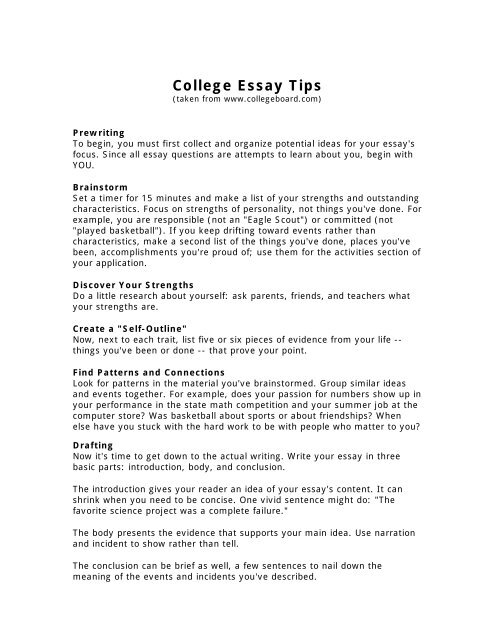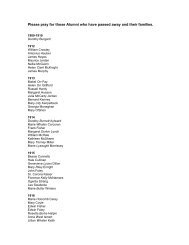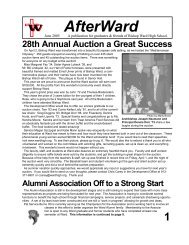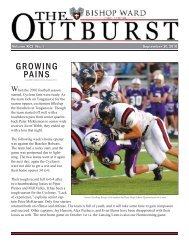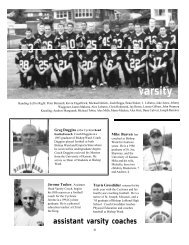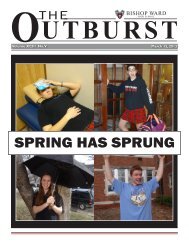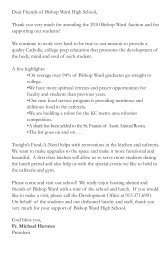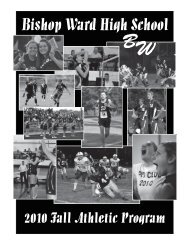College Essay Tips
College Essay Tips
College Essay Tips
Create successful ePaper yourself
Turn your PDF publications into a flip-book with our unique Google optimized e-Paper software.
<strong>College</strong> <strong>Essay</strong> <strong>Tips</strong><br />
(taken from www.collegeboard.com)<br />
Prewriting<br />
To begin, you must first collect and organize potential ideas for your essay's<br />
focus. Since all essay questions are attempts to learn about you, begin with<br />
YOU.<br />
Brainstorm<br />
Set a timer for 15 minutes and make a list of your strengths and outstanding<br />
characteristics. Focus on strengths of personality, not things you've done. For<br />
example, you are responsible (not an "Eagle Scout") or committed (not<br />
"played basketball"). If you keep drifting toward events rather than<br />
characteristics, make a second list of the things you've done, places you've<br />
been, accomplishments you're proud of; use them for the activities section of<br />
your application.<br />
Discover Your Strengths<br />
Do a little research about yourself: ask parents, friends, and teachers what<br />
your strengths are.<br />
Create a "Self-Outline"<br />
Now, next to each trait, list five or six pieces of evidence from your life --<br />
things you've been or done -- that prove your point.<br />
Find Patterns and Connections<br />
Look for patterns in the material you've brainstormed. Group similar ideas<br />
and events together. For example, does your passion for numbers show up in<br />
your performance in the state math competition and your summer job at the<br />
computer store Was basketball about sports or about friendships When<br />
else have you stuck with the hard work to be with people who matter to you<br />
Drafting<br />
Now it's time to get down to the actual writing. Write your essay in three<br />
basic parts: introduction, body, and conclusion.<br />
The introduction gives your reader an idea of your essay's content. It can<br />
shrink when you need to be concise. One vivid sentence might do: "The<br />
favorite science project was a complete failure."<br />
The body presents the evidence that supports your main idea. Use narration<br />
and incident to show rather than tell.<br />
The conclusion can be brief as well, a few sentences to nail down the<br />
meaning of the events and incidents you've described.
An application essay doesn't need to read like an essay about The Bluest Eye<br />
or the Congress of Vienna, but thinking in terms of these three traditional<br />
parts is a good way to organize your main points.<br />
There are three basic essay styles you should consider:<br />
Standard <strong>Essay</strong><br />
Take two or three points from your self-outline, give a paragraph to each,<br />
and make sure you provide plenty of evidence. Choose things not apparent<br />
from the rest of your application or "light up" some of the activities and<br />
experiences listed there.<br />
Less-Is-More <strong>Essay</strong><br />
In this format, you focus on a single interesting point about yourself. It<br />
works well for brief essays of a paragraph or half a page.<br />
Narrative <strong>Essay</strong><br />
A narrative essay tells a short and vivid story. Omit the introduction, write<br />
one or two narrative paragraphs that grab and engage the reader's attention,<br />
then explain what this little tale reveals about you.<br />
Editing<br />
When you have a good final draft, it's time to make final improvements to<br />
your draft, find and correct any errors, and get someone else to give you<br />
feedback. Remember, you are your best editor. No one can speak for you;<br />
your own words and ideas are your best bet.<br />
Let It Cool<br />
Take a break from your work and come back to it in a few days. Does your<br />
main idea come across clearly Do you prove your points with specific<br />
details Is your essay easy to read aloud<br />
Feedback Time<br />
Have someone you like and trust (but someone likely to tell you the truth)<br />
read your essay. Ask them to tell you what they think you're trying to<br />
convey. Did they get it right<br />
Edit Down<br />
Your language should be simple, direct, and clear. This is a personal essay,<br />
not a term paper. Make every word count (e.g., if you wrote "in society<br />
today," consider changing that to "now").<br />
Proofread Two More Times<br />
Careless spelling or grammatical errors, awkward language, or fuzzy logic will<br />
make your essay memorable -- in a bad way.


